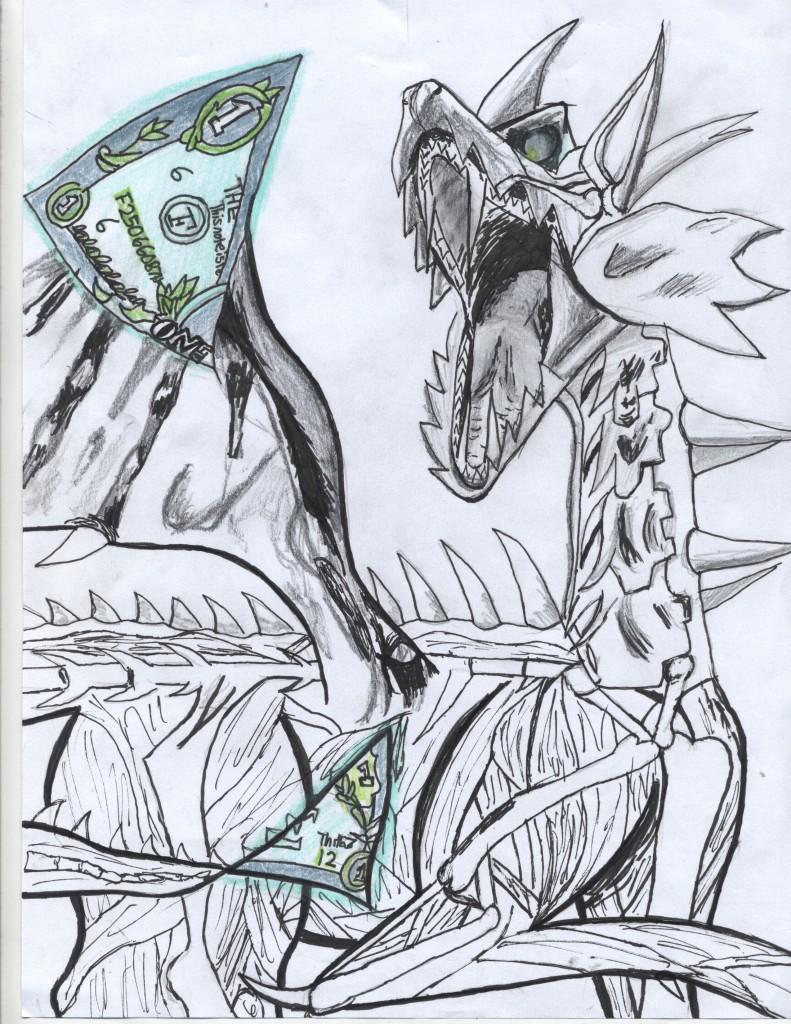Society’s obsession with money
Photo By McKayla Helm
On October 29, 1929 the stock market crashed, and since then society’s obsession with money has become life or death.
February 24, 2014
What’s green, made from trees and has a choke hold on the necks of humans? A green, vicious monster isn’t made from trees, but that’s a good guess. It’s money. Money is the green, vicious monster.
Our world revolves around money. It’s become more important than water or food. Mainly because without money, we wouldn’t be able to get water or food.
We pay to educate ourselves so we can work, we overwork to make enough money to live and then we use that money to pay for food, shelter and water: life necessities.
Greediness, desperate actions and workaholism are all outcomes of money or the lack of it.
Without money, desperate people do desperate things. Prostitution, dealing drugs and killing people are only some of the ways people have come up with.
We blame murderers and drug dealers for deaths and prostitutes for spreading diseases, but the truth is we have no one to blame but ourselves for making them think they have to go so low in order to making a living. Our world started this obsession when the first coin was pressed.
According to Seventeen.com, teenage girls are turning to “sugaring” in order to make money. Girls are literally getting paid by older men to go on dates. They pay for college, clothes and other things the girls want. Those “sugar babies,” just trying to take a load off their parents shoulders by raising money their own way, commonly face assault and rape. Is money so important that kids and teenagers have to put themselves into dangerous situations in order to make something of their lives? It doesn’t have to be.
Some people who have a hard time making money turn to alcohol and drugs or worse: killing themselves. On Black Thursday, October 29, 1929, the stock market crashed so drastically, it is said that many people were jumping out of buildings, running from their problems.
A piece of paper and molded coins control the lives of humans on this planet. Teenagers think when they get out of their house and into the real world they are free from their overbearing parents. Wrong. Something else takes control, something no human will ever escape in this life.
The worst part about money is the unequal distribution of it. According to the sociology department at the University of California at Santa Cruz, the upper class in America (one percent) owns 35.4 percent percent of the money and the middle class is slowly disappearing. Such undeserving people have more money than they know what to do with, while families in Africa suffer from starvation.
If life necessities were free, and the things that are unnecessary were priced, then those who are suffering might have a chance in survival. Fruits and vegetables can be grown in gardens, while chips and cookies can be shelved in stores. Water from the ocean can be desalinated for drinking water, while water for showers and baths can be paid for. Materials as well as sewing instructions can be taught for free, while name brand items can be sold at a higher price.
Top brand names like UGG, Channel and Rolex are all expensive on the account that they are world known. There might not be anything particularly special about their items, and they might only cost a small price to make while we’re spending hundreds, even thousands, on them. Companies could switch out their “high quality” material for inexpensive material to benefit themselves and make a better income, and we would never know. Rolex watches are a big deal to own in America, but in their home country Switzerland they are “average” watches. It is said the only reason Rolex is so highly appreciated in America is because it’s one of the only Swiss names we can pronounce.
I have a feeling money will be the start of the next world war. As of February 4, 2014, America is over 17 trillion dollars in debt and increases 2.5 billion per day according to the U.S. National Debt Clock. We owe nine countries money, not including oil exports. If those nine countries, including China, Japan and Russia, decided to ally with each other and turn on America, we would never stand a chance. And in the end (if we survived) we would STILL owe money to nine plus countries and the countries we asked for back up.
If you have no money, you’re starving and cold on the streets. And what do you do? Continue to beg for money. Although, wasn’t it money that put you there to begin with? Maybe change in coins isn’t what we need; we need a change in the system.



